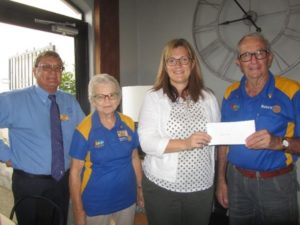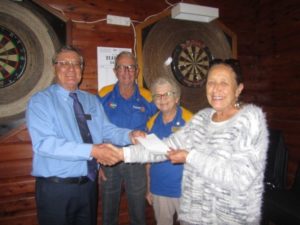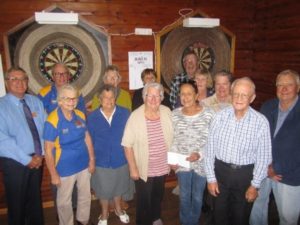2022 Council on Legislation elevates equity and inclusion, approves dues increase
Representatives to the 2022 Council on Legislation voted overwhelmingly on their first day of sessions to add “equity and inclusion” to Rotary International bylaws, affirming the organization’s continued effort to be inclusive of all cultures, experiences, and identities, and to reflect the communities it serves.
The four-day conference, held in Chicago, Illinois, USA on 10-14 April, marked Rotary’s first successful attempt to host a hybrid international event since the outbreak of the COVID-19 pandemic. About 520 representatives represented Rotary districts around the world; about 60% attended in-person, and the rest participated via Zoom.
This year’s Council reviewed and voted on more than 90 enactments that would change RI’s constitutional documents. Among the highlights is the legislation that promotes diversity and builds a well-balanced Rotary membership.
Proposed by the Rotary Club of Annanagar Aadithya, India, (District 3232) the enactment passed by a vote of 420 to 56. Amended Rotary bylaws now state that “each club or Rotaract club shall endeavor to build a well-balanced membership that celebrates diversity, equity, and inclusion.” Rotary prohibits clubs from denying an individual membership due to gender, race, color, creed, national origin, or sexual orientation.
“We have now made growing and diversifying our membership a top internal organizational priority,” said Valarie Wafer, who chairs RI’s Global Diversity, Equity, and Inclusion task force.
“Feeling welcome and comfortable with fellow club members is the single greatest driver of member satisfaction, and retention,” Wafer maintained. “By adding equity, we are thoughtfully considering how to provide differing levels of support, opportunities, and resources so everyone can have a welcoming and valuable experience. Adding inclusion ensures that we focus on creating experiences in which all people are welcomed, respected, and valued.”
Club Administration Pilot
Duane Benton, a member of the Rotary Club of Kansas City and a federal judge, who co-chaired this year’s Council, characterized multiple items at this Council as part of Rotary’s continued commitment to improving club and organizational flexibility.
An enactment that generated vigorous discussion before passing by a vote of 324 to 150 would allow the RI Board to pilot a new regional governance structure for clubs and Rotarians.
The pilot will be limited to Rotary Great Britain and Ireland (RIBI) as well as clubs and districts in Australia, New Zealand, and the South Pacific for a duration of six years.
Cosponsors of the legislation – the RI Board and the Rotary Club of Merimbula (District 9705) in Australia, stated that the current regional governance structure, put in place over 70 years ago, has grown into a “significant hierarchy” with too many layers and roles.
“It is appropriate to modernize and consider new models that can enhance our efficiency, increase the ability of members to access support, and look at new ways to make volunteer positions more manageable and doable,” said Wafer, who spoke on behalf of the RI board.
Representatives who opposed the enactment argued that the plan for the pilot lacks specifics and could reduce the number of districts and put a district governor’s role at risk. One representative from District 3490 (Taiwan) expressed concern that the plan could alter the autonomous structure of Rotary clubs, leading to centralized governance and decreasing localized management.
Wafer, reassured Rotarians that the districts and the role of district governors will not be eliminated while the pilot is being implemented. Following a six-year experiment, she said if the findings indicate that the existing model needs to be reverted, the role of district governors will still exist.
“This is not to force fit a new governance structure,” Wafer added. “Rather,we try to work in partnership with districts to see what works and what doesn’tfor a more sustainable future.”
Dues Increase
Representatives approved a dues increase for each of the next three years. Dues that clubs pay to RI per member are set at $35.50 per half year in 2022-23. Dues will increase to $37.50 per half year in 2023-24, $39.25 per half year in 2024-25, and US$41.00 per half year in 2025-26.
“The proposed dues adjustment is based on the most current forecasting information,” said RI Director Elizabeth Usovicz. She attributed the dues increase to lower membership, lower earnings, and fluctuating inflation. “The approval will now enable Rotary to respond quickly and compassionately to humanitarian needs.”
The Rotary Magazine Network
Rotary currently has 33 magazines across worldwide. Representatives rejected a proposal that would have required members to receive a digital copy of any of the magazines unless they request a printed copy.
Currently, every Rotary magazine is required to offer a digital alternative for the readers, said RI Director Ananthanarayanan S. “Venky” Venkatesh. But subscriber data show that only 8% have opted for a digital copy. The majority prefer the print version. Moreover, nearly 70% of members have reported in recent surveys that they still read books and magazines on paper.
At the same time, Rotary magazines are exploring ways to make their output more environmentally friendly while balancing the cost of publication.
On a related vote, delegates have also affirmed Rotary’s bylaws that mandates magazine subscription for each member.
A 2020 Rotary survey shows that 84 percent said the magazine strengthens their connection with Rotary, allowing them to better understand the organization. Making the subscription optional will decrease the level of consistent Rotary knowledge and engagement among its members, said Sylvia Whitlock, a trailblazer who was the first female club president in the history of Rotary.
“The magazine is a primer for Rotary members keeping us informed on the who, what, when, where, why and how of the world,” said Whitlock. “Without the magazine everything is just happenstance. Any good primer is beside you all the time.”
Standing ovation for Ukraine
During a legislative session on April 12, RI President Shekhar Mehta recognized Hennaddii Kroychyk, a delegate from the Ukrainian city of Lviv, who left his war-torn country and took a circuitous journey to Chicago for the Council. “Hennadii made the trip here even with the tragedy that is unfolding in Ukraine,” said Mehta. “We want you to know that we stand with you and your country.”
Kroychyk received a standing ovation from attendees in the room for what Mehta called “fulfilling his duties under extreme circumstances and demonstrating such commitment to Rotary.”
Electronic Policymaking
“What we have done for the 2022 Council on Legislation is unprecedented,” says Benton. “About 200 delegates from every continent participated in the deliberations via Zoom. Despite the time differences, participants debated and voted on proposals as if they had been there in person. This is the full flowering of electronic policymaking.”
Benton added, “What we accomplished in this session shows that we can do both in-person and hybrid Councils.”
Download voting results







